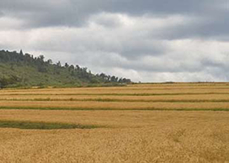Land Use and Development Farming viability in a changing landscape
 The world faces a resource management challenge which will require a renewed approach to communication, flexibility and understanding in planning and farm diversification, in order for farmers to remain financially viable and feed our growing global population.
The world faces a resource management challenge which will require a renewed approach to communication, flexibility and understanding in planning and farm diversification, in order for farmers to remain financially viable and feed our growing global population.
Agribusiness has a public relations issue which should be taken seriously by the industry as a whole. A discerning population is looking for choice, with a nostalgic image of farming which can no longer feed them, based on technological advances they do not understand or trust.
An anti-agribusiness movement has arisen which feeds consumers misleading information, and there is a mainstream media that celebrates shortcomings and hardships rather than achievements and successes. Confidence and trust in agribusiness is needed and this can only be achieved through improved communication. For farmers, a fair financial return on investment in a volatile market environment can be an issue, with many seeking expansion and scale to ensure viability. Technology is available to improve the utilisation of resources. However, these are poorly understood by a non-farming population, including planners, who often believe that scale and intensification is unnatural and leads to poor environmental, quality of life and animal welfare outcomes.
Investment researching the outcomes of technologies to support agribusinesses need for expansion and technology adoption through industry, research and government collaboration would be a step in establishing confidence in change. Management of land in terms of policy and legislation should address the question “can the tide of urban populations be stopped, diverted or taught to live in harmony with their rural cousins?” Incentivising the use of land for agricultural purposes thorough taxation, securing land through trusts and specific planning designations plus policy and legislative objectives which focus on key areas of agricultural development should be encouraged.
Any recommendations should centre on improving the outcomes of agribusiness expansion and intensification through more effective engagement with the media and the general public.
Government and agribusiness cooperation is needed to compile data on existing developments and create a database of approved technologies. The aim being to give planners added confidence in approving intensive farming developments, when such developments compete with the needs of urban expansion. Efforts to retain agricultural land in production through taxation and marketing intensive urban living as a desirable and environmentally friendly option, would ease the pressure on land release and reverse sensitivity by maintaining critical mass of both agribusiness and housing.
Innovative solutions for production with fewer resources
Moving forward, the challenge is one of acceptance to the inevitability of change and deciding how those changes will be managed. Increasing global population’s need for food will see an increased pressure on natural resources including water, land, people and climate.
Agriculture has historically done well in developing new innovations. As the population has become urbanised, technology has taken the place of people and animals.
Many innovative methods are being employed by farmers in order to adapt to changes in growing conditions which ensure viability for these farmers, despite the prioritisation of other needs ahead of agriculture. For example, drip irrigation technology from Netafim allows targeted use of water, enabling areas that are extremely arid and hot to produce food. Environmentally controlled systems utilise technology to create environments within areas that would otherwise not support many particular types of production.
Agribusiness is well placed in its ability to deal with land and climate change. This can be counter-productive for prioritising current agricultural land, as it can re-assure decisionmakers that food security can be maintained with less land, hindering efforts to preserve quality land close to cities.
What can farmers learn or adopt?
A study into the global challenges and potential solutions for the intensification and development of agribusiness is broad and varied. The topic is, in itself, complicated as it relies heavily on managing people’s fears and uncertainties; the feeling of confidence in a situation needs to be established for development to occur. The understanding gained may send a farmer onto a different path to diversification based on their specific licence, for example, niche products like ice-creams or agri-tourism.
The understanding gained may allow for farmers to build licence through the engagement of local “thought leaders”. Thought leaders are respected members of the community, who are able to influence the greater community. By engaging these types of people, the desires or fears of potential complainants can be mitigated or built into the development plan.
It is true however that a farmer may have the rights under planning law, engage with stakeholders, explore diversification and still not gain a licence. There are times where the only solution is to ensure that the development proposal is still viable with the added cost of defending the proposal. The defence of the proposal can easily equal or exceed the original development documentation cost.
A variety of different legislation, policy and schemes need to be investigated to discover ways in which agribusiness could remain viable in a changing landscape. In analysing these there are a range of goals against which they are measured. There is need to summarise the desired outcomes in terms of retaining agricultural land in production and limiting changes to the rural demographic. Kenya is in a position to learn from international legislative experience in determining and establishing its own.
Some key areas guide and focus farmers looking to intensify, expand or develop their land. Having situational awareness of licencing and managing the fear response to change cannot be underestimated. Time and money can be saved by engaging with community stakeholders early. In doing so, Farmers have an opportunity to allow for potential objectors fears and desires to be factored into development proposals, before investing in the proposal documentation is made.